TECHNICAL PAPERS
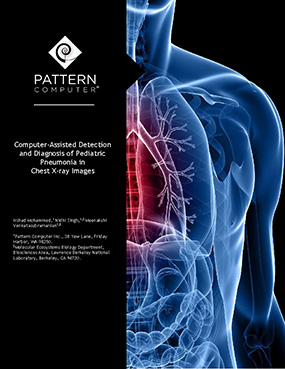
Computer Assisted Detection and Diagnosis of Pediatric Pneumonia in Chest X-ray Images
Machine learning approaches, such as deep learning, have exceeded human performance across many visual tasks. They’ve done so by using automated hierarchical feature extraction and classification by multiple layers to detect distinct patterns in high-dimensional data sets allowing quantification of the disease state and the prediction of the course the disease will take. In this white paper, we present a deep learning-based algorithm that can accurately detect community-acquired pediatric pneumonia and distinguish its etiology in chest X-ray images. Notably, our model outperformed state-of-the-art classifiers in terms of all performance metrics across the classification tasks. Furthermore, our algorithm can localize areas that are most indicative of infection without using any localization data to train the system.
Read the paper here.
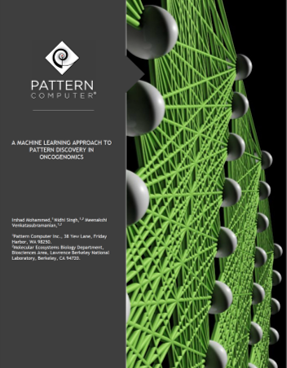
Machine Learning Approach to Pattern Discovery in Oncogenomics
Machine learning-based algorithmic frameworks show immense potential in extracting relevant features and to discover patterns from complex biomedical data that may provide clues to the underlying biological processes. In this white paper, we present a novel algorithm for pattern discovery and its application in discovering biologically relevant genes and gene associations in unlabeled, and sparse genomic datasets. The strength of our method is not only in embracing the complexity of genetic architecture to identify distinct patterns embedded in a noisy background in a purely data-driven way, but also the ease with which it can be integrated into a comprehensive and flexible framework for data mining and actionable knowledge discovery that goes beyond human genetics and genomics.
Read the paper here.
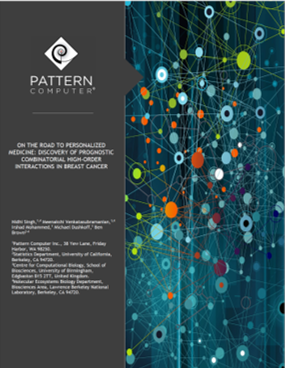
On the Road to Personalized Medicine: Discovery of Prognostic Combinatorial High-Order Interactions in Breast Cancer
Complex diseases such as cancer are influenced by many genes all of which may be associated with disease risk in ways that often go beyond being simply additive. Searching for collections of such genes that exhibit signatures of interactions poses great statistical and computational challenge due to the exponential scale of possible combinatorial high-order relationships (>> 10^22). In this paper, we reference our proprietary approaches integrated into PCI’s Pattern Discovery Engine™ that enables identification of complex, non-linear interactions by decoupling the order, or size, of interactions from the computational cost of identification. This presents a substantial advantage over existing approaches and uniquely positions our technologies for the discovery of high-order interactions allowing us to derive insights from systems of previously intractable complexity.
Read the paper here.
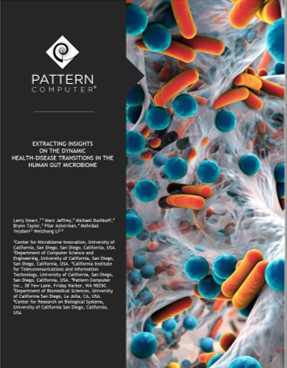
Extracting Insights on the Dynamic Health-Disease Transitions in the Human Gut Microbiome
Biological datasets are extremely complex in nature and often contain measurements that are uninformative or redundant. Because of “the curse of dimensionality,” many existing dimensionality reduction methods lack power when applied to such high-dimensional data. Using the Pattern Discovery Engine™ coupled with a hypothesis-free approach, we analyzed a dataset of 50 human microbiome samples, each with the relative abundance of the ~10,000 KEGG protein families. Out of the 10K total, we identified 39 KEGGs that were significant in differentiating the disease states from each other and from healthy, with 9 of the KEGGs being most associated with a dynamic path from disease to health in the human-gut microbiome. Interestingly, the biochemical pathways that 6 out of the 9 KEGG protein families are associated with led us to hypothesize that Inflammatory bowel disease, like other inflammatory diseases, may be associated with abnormal oxidative phosphorylation or oxidative stress that warrants further studies.
Read the paper here.
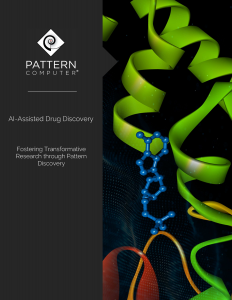
AI-Assisted Drug Discovery
Artificial Intelligence, particularly machine learning (ML) technologies, has the potential to revolutionize drug discovery. PCI’s Pattern Discovery Engine™ is a unique, proprietary computational platform that utilizes large number of samples and several different data types to extract hidden patterns and associations from complex, high-dimensional biomedical data to generate testable hypotheses. These hypotheses include potential combinations and repurposed drug candidates, as a means of delivering rapid and cost-effective therapeutic solutions for hard-to-treat oncological and non-oncological malignancies.
Read the paper here.
